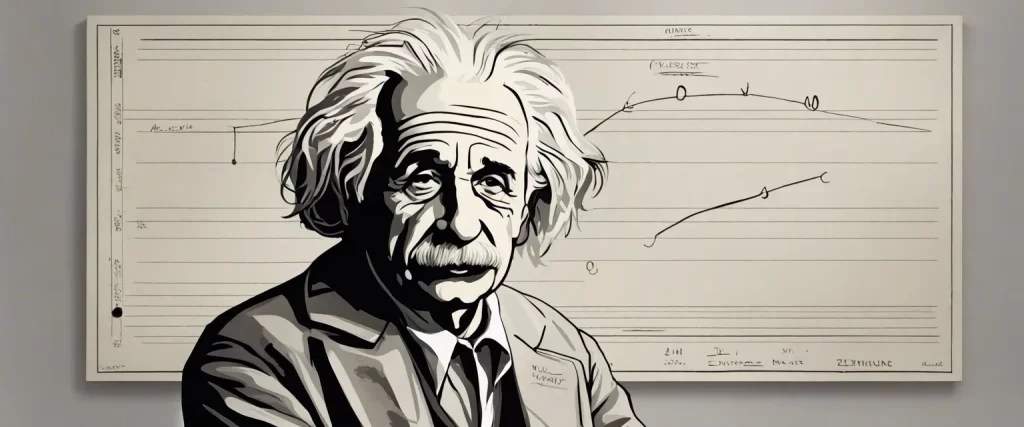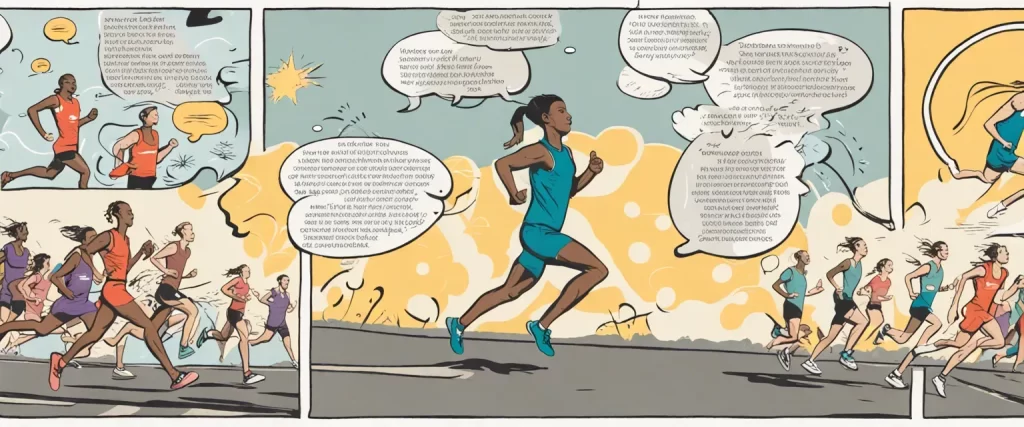——What I Talk About When I Talk About Running by Haruki Murakami & Einstein by Walter Isaacson
In the realm of literature, there exists a diverse array of genres and styles that captivate and inspire readers. Two such distinct works, “What I Talk About When I Talk About Running” by Haruki Murakami and “Einstein: His Life and Universe” by Walter Isaacson, delve into the lives of two extraordinary individuals who have significantly impacted their respective fields. While Murakami reflects upon his personal journey as a novelist, long-distance runner, and Zen practitioner, Isaacson’s comprehensive biography meticulously unravels the complex life and groundbreaking scientific contributions of one of the greatest intellectuals of all time, Albert Einstein. Despite their divergent subject matters, both books offer profound insights into the human condition, exploring themes of self-discovery, determination, and the search for meaning. This comparative study aims to unravel the threads that connect these works, shedding light on the shared experiences of Murakami and Einstein, while delving into the ways their distinct passions intersect and enrich their lives.
Brief Summary of Two Books
What I Talk About When I Talk About Running by Haruki Murakami
What I Talk About When I Talk About Running” is a memoir by acclaimed Japanese author Haruki Murakami. The book explores Murakami’s deep connection with running and the impact it has had on his life and writing.
In the book, Murakami reflects on his journey as a runner, starting from his decision to become more physically active in his thirties. He shares personal anecdotes about his experiences participating in numerous marathons and triathlons, including the challenges he faced and the lessons he learned along the way.
While discussing the physical aspects of running, Murakami also delves into the mental and philosophical aspects of the sport. He delves into the discipline and determination required to persevere during training and race days, drawing parallels between running and the solitary nature of writing.
Murakami intertwines his narrative with insights into his writing process, revealing how running serves as a means of inspiration and clarity. He highlights the similarities between the long-distance runner’s mentality and the solitary nature of the writer’s craft, emphasizing the need for dedication, perseverance, and focus in both pursuits.
Throughout the book, Murakami’s introspective style and lyrical prose offer readers a deep understanding of his inner thoughts and reflections. He delves into themes of aging, self-discipline, and the pursuit of excellence, using running as a metaphor for the human experience.
“What I Talk About When I Talk About Running” is a contemplative and introspective memoir that serves as an exploration of running as a metaphor for life. It offers readers a glimpse into the mind of a revered author, showcasing his unique perspective on physical and mental challenges, endurance, and the unyielding pursuit of personal and creative growth.
Einstein by Walter Isaacson
Einstein” by Walter Isaacson is a biography that delves into the life, work, and influence of one of the most brilliant minds in history, Albert Einstein. The book explores Einstein’s childhood in Germany, his struggle at school due to unconventional thinking, and his early professional life as a patent examiner. It goes on to recount his groundbreaking scientific achievements, beginning with his theory of relativity and his iconic equation, E=mc².
Isaacson delves into Einstein’s personal life, shedding light on his complicated relationships, including the tumultuous marriages and affairs. The author explores how Einstein’s Jewish background and his experiences living through World War I and the rise of the Nazi party influenced his advocacy for civil rights, pacifism, and Zionism.
The biography also delves into Einstein’s enduring fame, examining how his scientific discoveries catapulted him to international acclaim, making him a symbol of genius and scientific revolution. Furthermore, the book discusses his impact on the scientific community, as well as his engagement in political activism and his role in shaping the development of nuclear weapons.
Overall, “Einstein” provides a comprehensive and detailed account of Albert Einstein’s life and legacy, capturing his brilliance, eccentricities, and influential contributions to science and society.
Comparison between Two Books

Similarities in Experts and Intellectuals
In both “What I Talk About When I Talk About Running” by Haruki Murakami and “Einstein” by Walter Isaacson, there are striking similarities between the portrayal of experts and intellectuals. These similarities can be summarized as follows:
1. Commitment to Mastery: Both books highlight the intense dedication of experts and intellectuals towards their respective fields. Whether it is Murakami’s pursuit of becoming a long-distance runner or Einstein’s relentless pursuit of understanding the universe, the protagonists display an unwavering commitment to mastery and continuous improvement. They embrace challenges, setbacks, and countless hours of practice in order to reach their goals.
2. Emphasis on Discipline: Discipline plays a central role in the lives of experts and intellectuals in these books. Murakami meticulously follows a disciplined training regimen, adhering to a strict schedule and pushing himself to overcome physical and mental obstacles. Similarly, Einstein’s insatiable curiosity for physics is fueled by his discipline to question established notions, experiment, and devote immense focus and concentration to his work.
3. Constant Pursuit of Knowledge: Both experts and intellectuals in these books exhibit a hunger for knowledge. They are always seeking new information and experiences to fuel their growth. Whether it is Murakami observing the world around him during his runs or Einstein delving deep into scientific literature, these individuals strive for continuous learning and expanding their intellectual horizons.
4. Resilience in the Face of Challenges: Experts and intellectuals often face significant challenges and obstacles on their journeys. Whether it is physical injuries hindering Murakami’s running or Einstein’s struggle to gain recognition for his groundbreaking theories, both individuals encounter setbacks and rejection. However, their resilience and determination enable them to persevere, adapt, and ultimately achieve remarkable success.
5. The Balancing Act: Both books emphasize the importance of maintaining a delicate balance in the lives of experts and intellectuals. Murakami acknowledges the need to balance his running with his writing career, recognizing that neglecting one aspect can hinder the other. Similarly, Einstein’s dedication to his scientific work is tempered by his commitment to family and maintaining a well-rounded life. This balance highlights the multidimensionality of their pursuits and the need for holistic growth.
Ultimately, “What I Talk About When I Talk About Running” and “Einstein” eloquently capture the shared attributes of experts and intellectuals. Regardless of their fields, these individuals exhibit dedication, discipline, curiosity, resilience, and an ongoing quest for knowledge. Through these depictions, both books shed light on the commonalities and characteristics inherent in the lives of those who strive for excellence and make significant contributions to their respective domains.
Divergences in Experts and Intellectuals
“What I Talk About When I Talk About Running” by Haruki Murakami and “Einstein” by Walter Isaacson are both non-fiction books that delve into the lives and thoughts of accomplished individuals. While one focuses on running and personal reflection, the other explores the life and intellect of Albert Einstein. When comparing these books, one significant divergence can be observed in how they approach the concepts of experts and intellectuals.
In Murakami’s “What I Talk About When I Talk About Running,” the author reflects on his own experiences as a long-distance runner and connects it with his personal philosophy on lifestyle and writing. Murakami places importance on the dedication and discipline required to become an expert in any field, emphasizing the pursuit of excellence through consistent effort. He describes how running has taught him valuable life lessons and shaped his writing career. For Murakami, expertise lies in the commitment to hone one’s skills and master a particular craft, such as running or writing.
On the other hand, Isaacson’s “Einstein” explores the life and intellectual contributions of Albert Einstein, a renowned physicist who revolutionized our understanding of the universe. Isaacson portrays Einstein as not just an expert in physics but also as an intellectual who constantly questioned and challenged established norms. Einstein’s intellectual curiosity and ability to think outside the box allowed him to achieve groundbreaking scientific breakthroughs. Unlike Murakami’s notion of expertise, Isaacson emphasizes the importance of intellectuals who transcend the boundaries of their fields and change the way we perceive the world.
Therefore, the divergence between the two books lies in their approach to experts and intellectuals. In “What I Talk About When I Talk About Running,” Murakami emphasizes the expertise that is developed through dedication, repetition, and discipline in a specific domain. Conversely, “Einstein” by Isaacson presents Einstein as an intellectual who embodies the spirit of questioning, challenging, and revolutionizing established knowledge, thereby highlighting the significance of intellectuals who think creatively and impact multiple domains.
Overall, while both books explore the lives of remarkable individuals, they offer divergent perspectives on the concepts of experts and intellectuals. “What I Talk About When I Talk About Running” focuses on expertise developed through dedication and mastering a specific craft, while “Einstein” highlights the intellectual curiosity and ability to challenge conventional wisdom that characterizes intellectuals like Albert Einstein.

Conclusion
Both “What I Talk About When I Talk About Running” and “Einstein” by Walter Isaacson are highly regarded books, but they discuss different themes and subjects.
“What I Talk About When I Talk About Running” is a memoir that delves into the author’s personal experiences with long-distance running. It explores the connections between running, writing, and life, providing insights into the mental and physical challenges of pursuing a passion. This book is ideal for those interested in running, as well as seeking inspiration for personal growth and reflection.
On the other hand, “Einstein” is a biography of Albert Einstein, one of the most influential scientists in history. Walter Isaacson delves into Einstein’s personal life, scientific achievements, and the impact his theories have had on our understanding of the universe. This book is suitable for those interested in science, history, and the life of a brilliant mind.
Ultimately, the choice between the two books depends on your personal interests. If you are passionate about running and seeking motivation, “What I Talk About When I Talk About Running” might be more worthy of reading. However, if you want to delve into the life of a remarkable scientist and explore the world of physics, “Einstein” would be a great choice.



